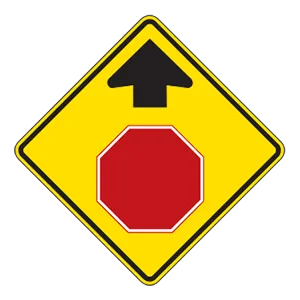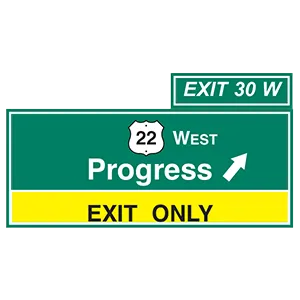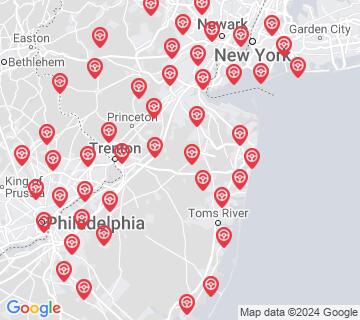DMV Permit Test #1
Motorcycle Test | License NJ 2026 | FREE Online Practice! #1 Page 3 of 7
Take this FREE motorcycle test (license in NJ 2026) to check your knowledge of the road rules. To improve your results, download a motorcycle handbook online, study theory, and practice for free on our website. Still worried about how to get a motorcycle license in New Jersey in 2026? Check our website for more sample tests, train as much as possible, and boost your grades!
50
40
16
15 . This sign means:

Do not block intersection.
Warning signs prepare drivers for upcoming road conditions and hazards and are usually yellow with black markings. This sign tells drivers that there is an upcoming stop sign and that they should prepare to come to a complete stop before proceeding.
16 . If you see this sign above your lane, you:

Must exit the freeway, if you stay in your current lane.
If a yellow panel with the message "Exit only" is on a highway sign, the lane below the sign will not continue through the interchange. Instead, the lane will go off of the roadway to form a ramp. If you are in a lane directly under an "Exit only" sign, you may change lanes to move through the interchange or you must exit the highway.
17 . It is most important to flash your brake light when:
Your signals do not work.
A motorcycle's single brake light is not as noticeable as the two larger brake lights of a car or truck. It can be a good idea to flash your brake light to help others notice it, especially when you need to slow down more quickly than surrounding drivers may expect.
18 . If someone is tailgating you, you should:
Allow them to pass.
The best way to deal with a tailgater is to let them get in front of you. If you can do so safely, change lanes and let the tailgater pass. Riding faster may only increase the danger by prompting them to continue tailgating you at the higher speed.
19 . At a minimum, how often should a motorcycle's hydraulic fluid be checked?
Before every ride
Pre-ride motorcycle inspections are an important part of ensuring safe riding. Hydraulic fluids and coolants should be checked at least once a week.
20 . On which of the following surfaces does a motorcycle have the best traction?
Leaves
A number of surfaces can provide poor traction for tires. Wet pavement; roads covered in loose gravel or sand; muddy, snowy, or icy areas; painted lane markings; and metal covers and plates in the road can be more hazardous for a motorcyclist than dry pavement.
21 . Most crashes occur during the day. To lessen the chance of being involved in a crash, you should:
Look for safer routes.
To minimize your chances of being in a crash, you should make yourself as visible as possible by wearing brightly-colored clothing when riding, even during the day.
Search the best driving school in your neighbourhood
2026 New Jersey | Frequently Asked Questions
To acquire a motorcycle driver's license in New Jersey, you must be at least 17 years old. You'll need to pass a knowledge test, vision screening, and a motorcycle road test. If you're under 18, you'll also need parental consent. Consider taking a Basic Rider Course to prepare for the road test and learn safety skills.
In New Jersey, the minimum age to obtain a motorcycle driver's license is 17. However, before getting the license, you must first obtain a motorcycle permit. To get this permit, you need to pass a written knowledge test and a vision test. After practicing with the permit, you can take the road test for your license.
Yes, in New Jersey, you need a specific motorcycle license or endorsement to legally ride a motorcycle. If you already have a standard driver's license, you can add a motorcycle endorsement. If you don't have a driver's license, you can obtain a standalone motorcycle license after passing the necessary exams and requirements.
To apply for a motorcycle driver's license in New Jersey, you'll need a valid New Jersey driver's license, proof of identity (such as a passport or birth certificate), proof of Social Security number, and proof of New Jersey residency. If you're under 18, you'll also need a consent form signed by your parent or guardian.
Yes, in New Jersey, you are required to take a written exam for a motorcycle license. This test evaluates your knowledge of motorcycle operation, traffic laws, and safety rules. It's designed to ensure you understand the fundamentals of riding a motorcycle safely. Passing this test is mandatory before you can obtain a motorcycle permit and later a license.
The motorcycle written test in New Jersey covers various topics including road rules, motorcycle laws, handling dangerous surfaces, carrying passengers and cargo, group riding, avoiding crashes, and alcohol and other drugs in motorcycle operation. It is designed to assess your knowledge of safe and lawful motorcycle operation.
No, you cannot substitute the written test with a motorcycle training course in New Jersey. The training course focuses on practical skills while the written test evaluates your knowledge of road rules and safety regulations. Both are essential components of obtaining a motorcycle license. You must pass the written test to get your permit, which is required before the road test.
To enroll in a motorcycle training course in New Jersey, you'll first need to find a recognized training provider. Then, sign up for the course online or in person, and pay the associated fee. The course typically includes classroom instruction and hands-on training. Upon completion, you may be eligible for a waiver for the riding skills test at the DMV.
No, you don't need to own a motorcycle for the license test in New Jersey. You can borrow a motorcycle, but it must be street-legal, properly registered, insured, and inspected. It's important that you're comfortable operating the motorcycle you'll be using for the test.
Yes, you can use a friend's motorcycle for the New Jersey driver's license evaluation. However, the motorcycle must be street-legal, properly registered, insured, and inspected. Make sure you are comfortable and familiar with the motorcycle's controls and operation before your test to ensure a successful evaluation.
Yes, in New Jersey, the Motorcycle Road Test specifically evaluates your ability to balance, accelerate, decelerate, turn, and perform maneuvers like serpentine riding, U-turns, and sudden stops. You're also assessed on your knowledge of traffic laws, road signs, and safe riding practices. This test ensures you're capable of handling a motorcycle safely on the roads.
Yes, New Jersey has a Graduated Driver License (GDL) program for new motorcycle drivers. Restrictions include no driving after 11:01 PM and before 5:00 AM, no carrying passengers, and all riders must wear a helmet. These restrictions are lifted after you've completed a Basic Rider Course and obtained your basic motorcycle license.
Yes, your New Jersey driver's license with a motorcycle endorsement allows you to legally operate a motorcycle in other states. However, you must abide by the traffic laws and regulations of the state you're visiting. It's always a good idea to familiarize yourself with these rules before you travel.
Yes, in New Jersey, it's mandatory for all motorcycle riders and passengers to wear a helmet. The helmet must meet the standards set by the U.S. Department of Transportation's Federal Motor Vehicle Safety Standard No. 218. It's also required to have reflective surfaces on both sides for safety purposes.
Yes, New Jersey offers two types of motorcycle licenses. The first is a motorcycle-only license, which permits you to operate only a motorcycle. The second is a motorcycle endorsement, which you can add to your existing New Jersey driver's license, allowing you to operate both a motor vehicle and a motorcycle.
Yes, in New Jersey, you can add supplementary endorsements to your motorcycle license. These may include endorsements for different types of motorcycles or specific driving situations. However, keep in mind that each endorsement may require additional testing or training, and there may be additional fees associated with adding endorsements.
Yes, the New Jersey Motor Vehicle Commission provides the motorcycle license test in several languages apart from English. These include Spanish, Arabic, Chinese, French, Korean, Polish, Portuguese, Russian, and Japanese. This ensures that diverse populations have access to the test and can understand the safety rules and regulations effectively.
An effective strategy to prepare for the motorcycle license test in New Jersey is to study the Motorcycle Manual provided by the NJ MVC. It covers all the information you'll be tested on. Taking online practice tests can also be beneficial as they simulate the actual test environment. Lastly, understanding traffic rules and signs is crucial for passing the test.
Yes, the New Jersey Motor Vehicle Commission offers the motorcycle written test in multiple languages besides English. These include Spanish, Arabic, Chinese, French, Korean, Polish, Portuguese, Russian, and Japanese. This is to accommodate a diverse population and ensure understanding of the rules and regulations for safe motorcycle operation.
If you fail the motorcycle written test in New Jersey, you are permitted to retake it. However, you must wait at least seven days before your next attempt. It's recommended to review the New Jersey Motorcycle Manual thoroughly before retesting to increase your chances of passing.




